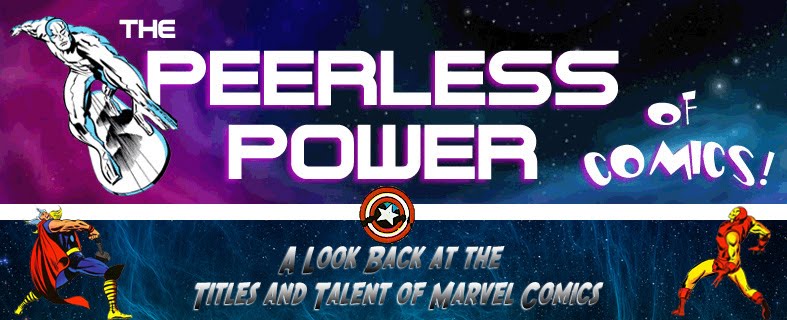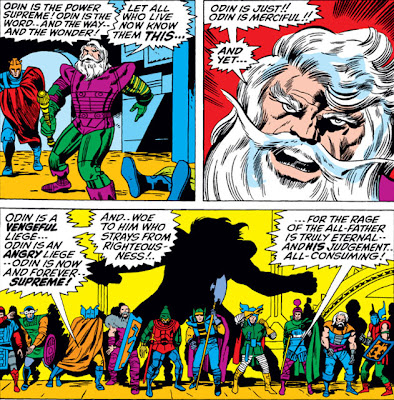In Parts One and Two of the fierce battle between Thor and the evil warrior-sorcerers known as the Enchanters, the Asgardians waged their battle on two fronts: Thor and his friends, Balder the Brave and the lady Sif, engaged the Enchanters Magnir and Brona on Earth, while the third Enchanter, Forsung, met Odin in a deadly duel in Asgard. Thor and his comrades managed to prevail, partly because of the powers of all participants except for Odin and Forsung being removed due to the conditions that the two established for their own conflict. But with Brona and Magnir vanquished, the question remains: What of Odin?
With no word forthcoming on the fate of their liege, Thor turns the Enchanters over to the N.Y.P.D., with the assurance that the Asgardians will again be at their service should the captives break free. Which leaves the stranded Asgardians pondering their fate, including one who ponders his own conflicting feelings regarding Thor's beloved.
Since Balder appears to be in no shortage of females ready to step in and make him forget all about the lady What's-Her-Name, it's time to move on to the more pressing matter of the one thread left hanging from the story--the victor of the vicious battle between Odin and Forsung. And we learn of the result in no uncertain terms, as Odin declares his victory in defiant, raging, and almost deafening words.
It would seem that Odin is sending a message to any other presumptuous challengers who might dare to take him on and attempt to remove him from the throne of Asgard--a message that makes it clear that there can only be one fate for anyone who's foolish enough to try. You might have the impression that Odin is going way overboard here, acting almost like a madman who's obsessed with keeping a tight grip on the power he holds in his position, even to the point of striking terror into the hearts of his own subjects--on the other hand, have you met Odin?
At any rate, Odin begins taking names and putting his house in order. The first order of business is to make sure the remaining Enchanters are dealt with, harshly and for all time--which also frees up a police detention cell, and lets a few very nervous guards off the hook.
From there, Odin moves on to his stranded subjects, while also feeling obliged to eavesdrop.
Both Sif and Balder re-pledge their fealty, and are subsequently spirited back to Asgard. But Thor will find that Odin, in his current mood, has no patience for an Asgardian who prefers to be an Asgardian in name only.
Odin often takes a disciplinary, almost brutal approach in his dealings with Thor--and in doing so here, he would seem to be depriving himself of a considerable advantage when it comes to the security of Asgard, since an exiled, powerless Thor isn't going to do Asgard any good if there are enemies at the gates, nor is Odin likely to relent and communicate with Thor if he's in need of him. Perhaps there are times when a father should take a step back and leave well enough alone. So Thor prefers to stay and help the mortals on Earth--so what? It's really not such a bad compromise for Odin to make, since Thor will still drop everything and return to Asgard to fight in its defense if the need should be there. Does Odin really need to have that daily "Hail, my liege!" from Thor every morning?
Perhaps the closest thing we have to an answer as to why Odin feels so strongly about this issue can be found in the story arc which introduces the mortal "Red" Norvell as the new Thor--a development made possible by a contingency plan set in motion by Odin, thanks to his son's constant absences from the realm.
How ironic, then, that Odin's plan only makes the situation worse.
As for the here and now, Odin would indeed return his son's power six issues later, claiming that his "discipline" of Thor was necessary because his son had lost his humility. Baloney. Odin was a raging loon at the time he acted against Thor, and his only intent was showing his son the penalty for disobedience.











3 comments:
Odin is as mad as a box of frogs (as we Brits say) with a fondness for bizarre hats - he's obviously deranged and there should have been a palace coup long ago. Just a question, CF - your profile says you've been a comic-book reader "since my early teens" - what took you so long to discover them ? I started reading Marvel comics when I was eight.
Colin, I think I began reading comics right around the time when my parents divorced (I think I was about 13 or so) and I started having a lot of time on my hands. I remember exploring some of the shops in my new neighborhood, and stopping at a news/magazine stand to browse. The comic books in the spinner rack caught my eye, and that was that. It was such a fun world to have stumbled across; I think the sheer variety of the material helped a lot to cultivate my interest in it. I found myself not only going back every month to see what was new, but also looking around for back issues of books that had stories I'd walked into the middle of. :)
"Hello, my name is Odin and I'm a rage-aholic."
"Hi, Odin!"
Yeah, he seemed to have a problem. And he killed a guy here (!), which good guys weren't supposed to do. It surprised me when I read it.
I think Lee and Kirby modeled the Big O after the Old Testament God, who was known to have a bit of a temper. Then again, the original Norse Odin had few if any good personality traits.
But I think the fact that Odin was such a tricky guy to be around made him interesting.
And occasionally completely unlikable.
M.P.
Post a Comment